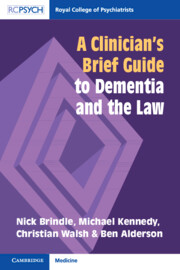Book contents
- A Clinician’s Brief Guide to Dementia and the Law
- A Clinician’s Brief Guide to Dementia and the Law
- Copyright page
- Contents
- Preface
- Common Abbreviations
- Chapter 1 Dementia
- Chapter 2 Dementia
- Chapter 3 Dementia
- Chapter 4 The Mental Capacity Act 2005
- Chapter 5 The Mental Health Act 1983
- Chapter 6 The Care Act 2014
- Chapter 7 Assessment of Capacity
- Chapter 8 The Diagnosis of Dementia
- Chapter 9 Care and Treatment Issues and the Law
- Chapter 10 Deprivation of Liberty
- Chapter 11 Discharge from Hospital
- Chapter 12 Abuse and Safeguarding
- Chapter 13 The Courts and Tribunals
- Chapter 14 The Interface between Dementia and the Criminal Justice System
- Book part
- References
- Index
Chapter 12 - Abuse and Safeguarding
Published online by Cambridge University Press: 20 July 2023
- A Clinician’s Brief Guide to Dementia and the Law
- A Clinician’s Brief Guide to Dementia and the Law
- Copyright page
- Contents
- Preface
- Common Abbreviations
- Chapter 1 Dementia
- Chapter 2 Dementia
- Chapter 3 Dementia
- Chapter 4 The Mental Capacity Act 2005
- Chapter 5 The Mental Health Act 1983
- Chapter 6 The Care Act 2014
- Chapter 7 Assessment of Capacity
- Chapter 8 The Diagnosis of Dementia
- Chapter 9 Care and Treatment Issues and the Law
- Chapter 10 Deprivation of Liberty
- Chapter 11 Discharge from Hospital
- Chapter 12 Abuse and Safeguarding
- Chapter 13 The Courts and Tribunals
- Chapter 14 The Interface between Dementia and the Criminal Justice System
- Book part
- References
- Index
Summary
The effects of dementia can make older people particularly susceptible to abuse and exploitation. Not only are they likely to be less able to articulate their feelings and experiences, but they may also be unable to remember or understand what has happened to them. People with dementia may also be less likely to seek help, advocate for themselves or have the mental or physical capacity to remove themselves from potentially abusive situations. The relatively high psychological and physical demands placed on family members who care for relatives with dementia may be a contributing factor. We will therefore discuss the law in relation to safeguarding, provided by the Care Act 2014. We will then consider how the three relevant acts, the Care Act, the Mental Capacity Act and the Mental Health Act, may be deployed in relation to safeguarding situations. Finally, we will discuss safeguards relating to lasting powers of attorney, and what to do if one has concerns about attorneys and deputies.
- Type
- Chapter
- Information
- A Clinician's Brief Guide to Dementia and the Law , pp. 120 - 128Publisher: Cambridge University PressPrint publication year: 2023

